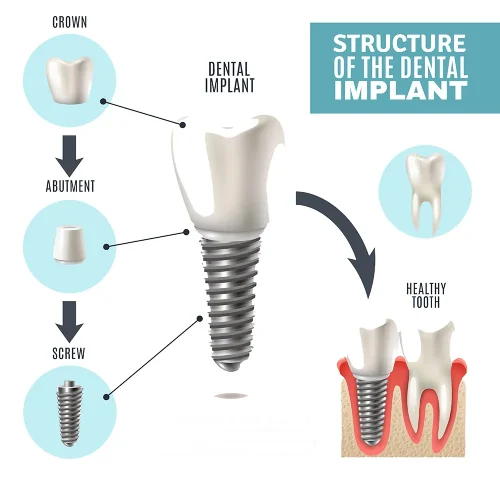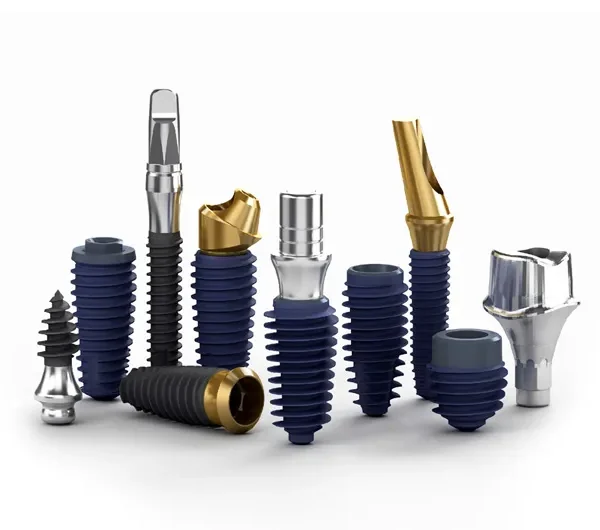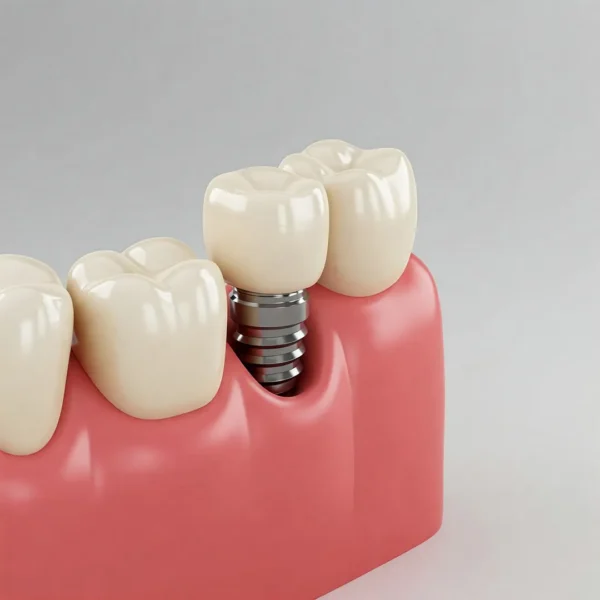Dental implants are considered one of the most reliable and long-term solutions for replacing missing teeth. At Queens Medical Center, we’ve helped thousands of patients regain their confidence and oral function through advanced implantology. However, one common concern patients have is: Can dental implants fall out?
Dental implants are titanium posts surgically inserted into your jawbone, acting as artificial roots for replacement teeth. Once placed, they fuse with the bone in a process called osseointegration. Over time, they provide a strong and stable base for crowns, bridges, or dentures—offering both function and aesthetics similar to natural teeth.

Can Dental Implants Fall Out?
Implant loss can occur:
- Shortly after surgery (due to poor integration or infection)
- Months or even years later (due to gum disease or trauma)

Common Causes of Implant Failure
At Queens Medical Center, we believe in patient education and prevention. Understanding the risks associated with implant failure can help you safeguard your investment:

Poor Oral Hygiene
Neglecting oral care leads to peri-implantitis—a gum infection around the implant that can destroy supporting bone tissue.
Inadequate Bone Density
For an implant to stay securely in place, it must integrate well with the bone. If the jawbone is too soft or thin and no bone grafting is done, implant failure is likely.
Smoking
Nicotine reduces blood flow to the gums, impairing healing and increasing the risk of implant rejection.
Chronic Conditions
Conditions like uncontrolled diabetes or autoimmune diseases may interfere with healing.
Excessive Force
Bruxism (teeth grinding), biting hard objects, or trauma to the face can place too much pressure on the implant.
Medication Side Effects
Some medications, like antidepressants or acid reflux drugs, have been linked to bone loss and implant instability.
Signs That Your Dental Implant Might Be Failing
- Pain or swelling near the implant site
- Bleeding or pus discharge from gums
- A loose feeling when touching the implant with your tongue
- Gum recession or visible implant threads
- Persistent bad breath or metallic taste
- Difficulty chewing or biting down
What to Do if Your Dental Implant Falls Out
Stay Calm and Don’t Panic
It can be alarming, but panicking may lead to further complications.
Preserve the Implant or Crown
Gently pick it up by the crown, rinse it with clean water (no chemicals), and place it in a container of milk or saline solution.
Rinse Your Mouth
Use warm saltwater to keep the area clean and reduce the risk of infection.
Avoid Eating
Refrain from eating until you see a dentist—especially hard or sticky foods.
Call Queens Medical Center Immediately
📞 Toll-Free: 800-QUEEN (800-78336)
📍 Visit us at any of our four branches: Dubai Marina, Burjuman, Jumeirah, or Al Rigga.
Can a Fallen Dental Implant Be Replaced?
Yes—most of the time, we can replace a fallen implant. The course of action depends on:
- The health of the surrounding bone and gum tissue
- The reason for implant failure (infection, trauma, improper placement, etc.)
- Whether additional procedures like bone grafting are required
Our experienced dental surgeons at Queens Medical Center will conduct a full evaluation, including digital X-rays and 3D scans, to determine the best treatment plan.
How to Prevent Implant Failure
- Maintain excellent oral hygiene (brushing, flossing, and mouthwash)
- Avoid smoking and limit alcohol consumption
- Protect your teeth with a nightguard if you grind your teeth
- Visit your dentist regularly for checkups and cleanings
- Report any unusual symptoms (pain, bleeding, loosening) early
Trust Queens Medical Center for Your Implant Care
📩 Email: info@queensmedicalcenter.ae
📞 Call Toll-Free: 800-QUEEN (800-78336)


